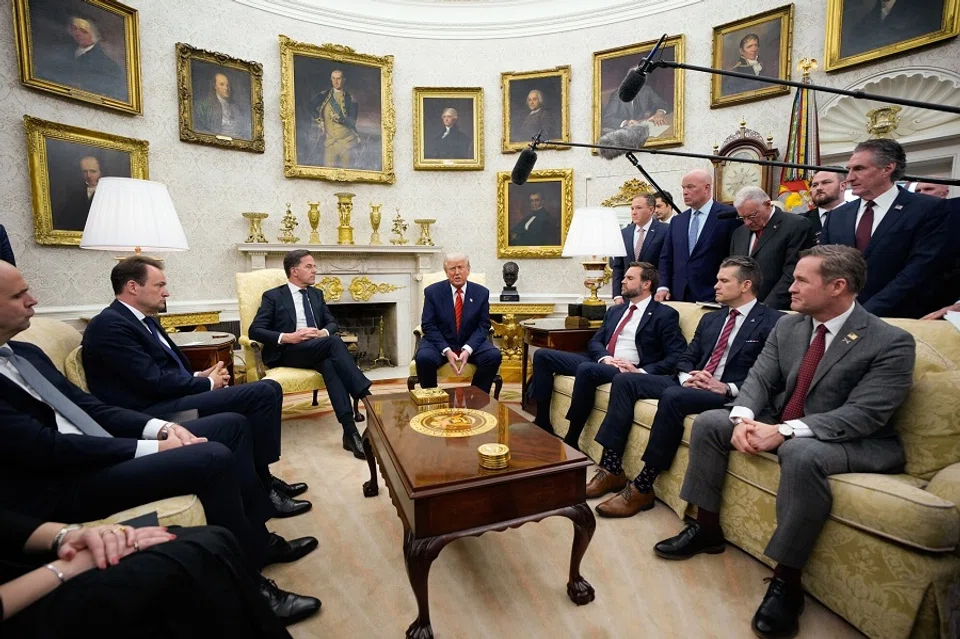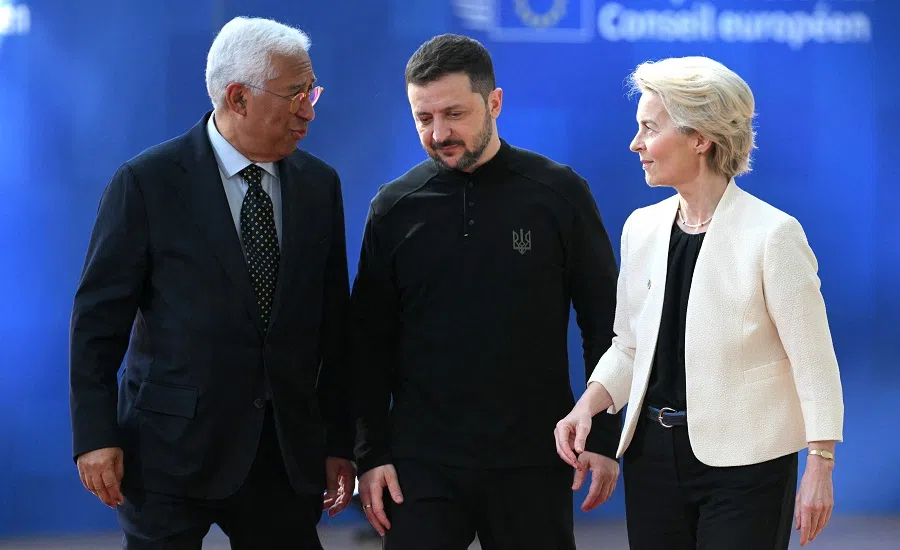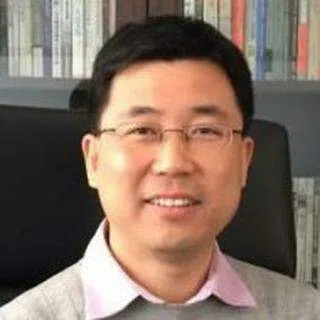Taiwan on its own? US rethinks global security and China strategy
How will US President Donald Trump’s isolationist and protectionist outlook impact Europe and other parts of the world that have been relying heavily on the US for support? Commentator Qi Dongtao tells us more about Trump’s global vision and how it will impact the world order and reshape spheres of influence, including mainland China and Taiwan.

US President Donald Trump is pressuring the EU and NATO on the issue of the war in Ukraine, forcing them to undergo a strategic restructuring. Right now, it is certain that Trump is determined not only to extricate the US from the Russia-Ukraine conflict but also to withdraw from European security affairs as much as possible, compelling the EU and NATO to take responsibility for Europe’s stability.
EU and NATO forced to step up
Under the circumstances, the EU and NATO must handle their relations with Russia more cautiously; otherwise, Europe could remain under the shadow of war for a long time, and its peace and development might face significant and prolonged pressure. To successfully navigate this challenging period of strategic restructuring, the EU and NATO will likely have to follow Trump’s push for a ceasefire in the Russia-Ukraine war while also working to enhance their own military capabilities in maintaining stability to achieve strategic independence in European security affairs gradually.
What remains uncertain is the extent to which the EU, NATO and Ukraine can accept a ceasefire agreement reached between the US and Russia. The current situation is highly favourable for Russia; any ceasefire deal between the US and Russia will likely benefit Russia as well, which is difficult for the EU, NATO and Ukraine to accept. So, the finalisation and successful implementation of a ceasefire agreement will not be smooth, with various potential uncertainties. This makes the timeline for achieving a genuine ceasefire highly unpredictable, though Trump is unlikely to delay the process for too long.
If US-Russia relations improve significantly and Russia is highly satisfied with the ceasefire agreement, it may temporarily restrain its aggressive stance and even seek to improve relations with the EU and NATO.

Another uncertainty is the amount of time it will take and to the extent to which the EU and NATO can achieve strategic autonomy. After a ceasefire in the Russia-Ukraine war, with the immediate crisis temporarily resolved, the EU and NATO will face greater domestic opposition from the public and opposition parties if they continue to significantly increase military spending. More importantly, the rapid rise of right-wing political forces within EU countries is intensifying conflicts between the left and right, leading to political instability and making integration among EU nations increasingly difficult.
US unlikely to completely abandon EU and NATO
In four years, if Trump leaves office, the US may once again strengthen its support and leadership over European allies, potentially reducing the EU’s motivation to pursue strategic autonomy. If US-Russia relations improve significantly and Russia is highly satisfied with the ceasefire agreement, it may temporarily restrain its aggressive stance and even seek to improve relations with the EU and NATO. This would help create favourable conditions for Russia’s post-war economic and military recovery and development, which could in turn reduce the EU’s incentive to drastically increase military spending.
In the long run and on a global scale, the fate of Europe and the US remains closely intertwined, and the US is unlikely to completely abandon the EU and NATO. The pressure Trump is putting on the EU and NATO now is likely aimed at forcing them to strengthen their military capabilities as quickly as possible, not only to better maintain stability in Europe, but also to align more effectively with US strategic interests in other regions around the world.

Right now, everyone is saying that the US wants to withdraw from Europe as soon as possible in order to concentrate its efforts on containing China. While Trump certainly wants to contain China, there are internal disagreements between him and his officials about why and how to do so, which brings uncertainty to America’s future strategy for countering China.
Republican establishment figures such as Secretary of State Marco Rubio are long-standing anti-China hawks. Their hostility toward Beijing stems partly from ideological reasons and partly from a desire to contain China to maintain US global dominance, particularly its hegemony in the Asia-Pacific region. As a result, their approach is similar to that of the Biden administration: prioritising geopolitics, geoeconomics, and the role of US allies in the Asia-Pacific while seeking to militarily contain China, with no real willingness to compromise with Beijing.
The US sphere of influence would logically include the Americas and the surrounding oceans, particularly the North Pacific and North Atlantic, which are closer to US territory.
A preference for dividing spheres of influence?
Unlike the Republican establishment, Trump does not believe that America’s role as a global hegemon benefits the country in economic, political, military, or soft power terms. On the contrary, he sees it as a losing proposition, often making the US the “sucker” that other nations — especially its allies — take advantage of. While he may still want the US to maintain economic dominance, he appears less interested in maintaining military and geopolitical control worldwide. Instead, he seems inclined toward dividing the world into different spheres of influence, with each region managing its own stability rather than relying on US intervention. This reflects his isolationist outlook.
The US sphere of influence would logically include the Americas and the surrounding oceans, particularly the North Pacific and North Atlantic, which are closer to US territory. This could explain why Trump has shown strong interest in the Panama Canal and Greenland, as both are strategically significant for controlling key maritime routes in these regions.

Trump has little interest in geopolitics and security and does not believe the US must act as a global “stabilising” hegemon. As a result, he does not view China as the severe threat that anti-China hawks do. Given his transactional mindset, he may even believe that he can pressure and entice China into making deals that contribute to his “Make America Great Again” (MAGA) agenda. This relatively flexible stance toward China is a key difference between him and Republican establishment figures like Rubio, and adds uncertainty to America’s China-containment strategy.
While it is certain that Trump will not abandon Taiwan as abruptly as he intends to withdraw support from Ukraine, it is also clear that he will not send US troops to defend Taiwan in the event of a military conflict with mainland China.
Implications for Taiwan
These uncertainties put Taiwan in a very challenging position. While it is certain that Trump will not abandon Taiwan as abruptly as he intends to withdraw support from Ukraine, it is also clear that he will not send US troops to defend Taiwan in the event of a military conflict with mainland China. This means Taiwan will have to be extra cautious in the next four years, avoiding any situation that could give Beijing an excuse to take military action.
Although Taiwan has been actively paying “protection fees” to the US, Trump does not see Taiwan as particularly important to his MAGA agenda — aside from its high-end semiconductor industry. If anti-China, pro-Taiwan figures such as Rubio fail to influence Trump’s policy decisions, Taiwan could face years of anxiety. Some US think tank scholars have already argued that losing Taiwan would not significantly impact America’s national interests, whereas going to war with China to defend Taiwan would cause incalculable damage to the US and the world. This is probably what Trump is also thinking.
This article was first published in Lianhe Zaobao as “西方战略重组的确定和不确定”.





